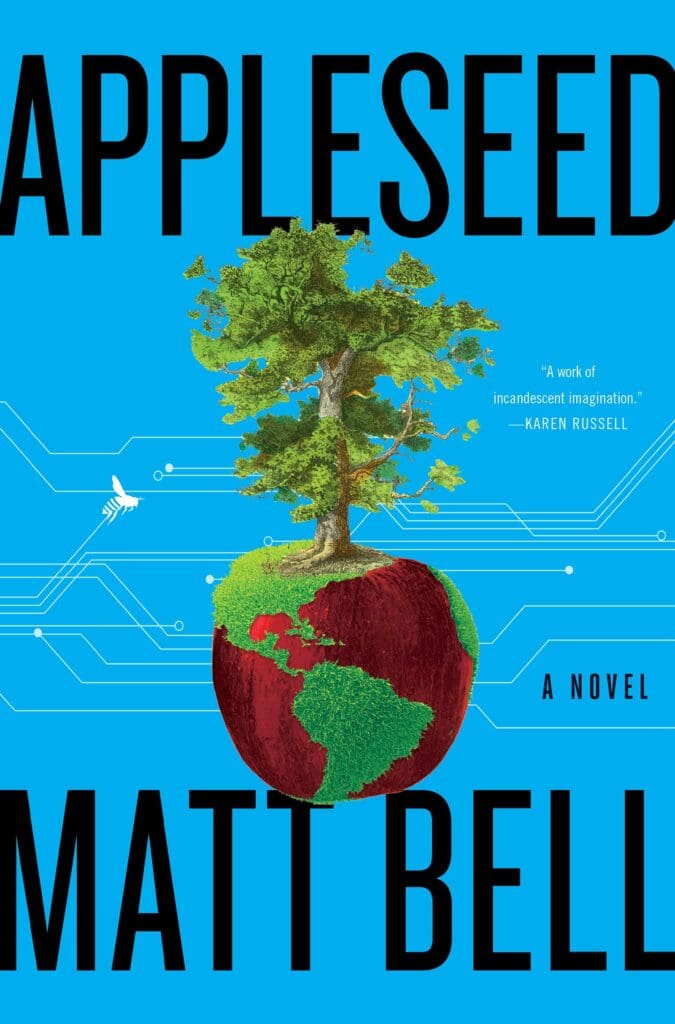From novelist Matt Bell comes his newest book, Appleseed (480 pages; Custom House), a story about the linked fates of three Ohioans: a malformed brother in pre-colonial America hunting the Tree of Forgetting, hoping to forget pasts he does and does not know; a near-future ecoterrorist resisting his former lover’s corporate dystopia across an abandoned United States; and a haunted cyborg crossing an icy, post-human purgatory to re-cultivate the Earth, which, despite lacking the vocabulary or Keatsian tradition, he instinctually knows is beautiful.
Sentence-level epics form on every page, the prose floating between beatific and elegiac:
This overripe abundance all around, the forest gagging itself upon a bright profusion of right living: flowers blooming, chicks crying out, infant rabbits in the brambles, and ducklings on every pond; bones everywhere, eggshells and carapaces, last year’s antlers bleached white amid fallen leaves, loosed entrails covered in the white castings of maggots.
Hoping to remove the comfortable distance from nature felt from inside the Anthropocene, Appleseed dissolves the barrier between world and body, body and mind. Again and again, the writing insists that humans are “of the world, not against…not apart or above,” but Bell is not content until that truth is felt. The novel’s sentences escape the mind and recruit the senses: a trail is described by “the stamped mud and broken twigs, the kicked-away pine straw and haphazard middens of fur-laced feces and owl pellets; the sound of birds pecking at exposed seeds; the smell of decaying matter being carried away by ants or beetles.” A character’s experience in a dark cave is explained as, “Sight reduced to a single beam of light, sound to his scrabbling hooves on the rocky ice, the huffing echos of his breathing, the free water coursing inside the glacier, its gurgling trickle moving below the frozen surface.”
Appleseed knows humankind’s inherent link to nature may not be obvious to twenty-first-century urban dwellers who, other than in the most abstract way, may not sympathize with and might even be bored by a naturalist text; like Appleseed’s most contemporary protagonist, they may struggle to connect with nature. Unlike John, however, they may not bomb dams and hack animatronic bees on a pseudo-feudal, bison-liquifying corporate farm.
Where Appleseed is not relatable, it is entertaining. The sci-fi is inventive, the fantasy alluring, and the odd formal choices—one-off chapters from minor characters, rapid tone shifts—surprisingly fluid. In one novel, there are terraforming witches and self-replicating amalgams of humanity’s collective consciousness. Thanks to Bell’s confidence, the novel’s distinct components form a cohesive whole. With his self-assurance, Appleseed can convincingly wax philosophical on birth, death, and consciousness; draw parallels to contemporary policing and corporatism, then link the two; and deliver a hundred still-enticing pages from an unvarying frozen wasteland.
Most impressive, however, is the coexistence of this confidence with Appleseed’s sincere passion (which begets vulnerability) for environmental improvement. The novel leans into this vulnerability, listings its fears for coming extinctions, a bleach-white sky, and the pending apocalypse. The novel’s ambitions are frightening ones. Trying to reconcile our existence with the damage humans are bound to cause poses thorny questions. “It’s impossible to do no harm, but how much harm is permitted?” “Is nothing sacred or is everything?” At its core, Appleseed is not a reproach nor a plea but a question: Is there anything we can do? Was there ever?

